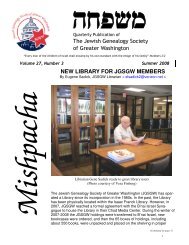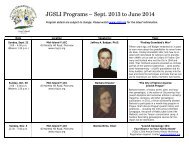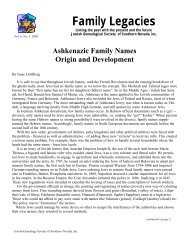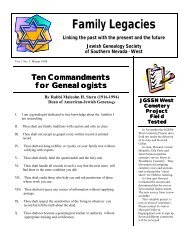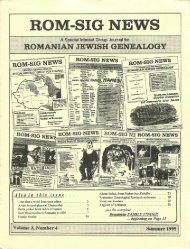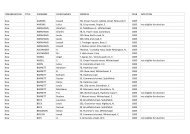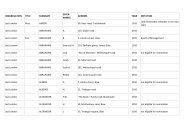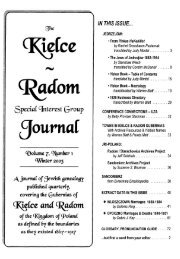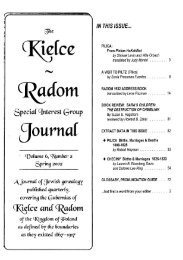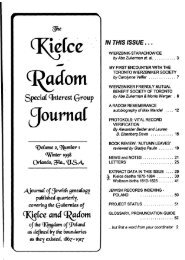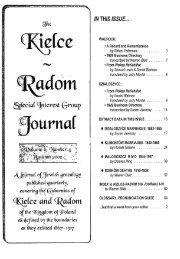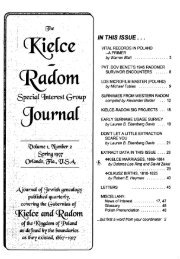THE MEMORIAL BOOK OF PÁPA JEWRY - JewishGen
THE MEMORIAL BOOK OF PÁPA JEWRY - JewishGen
THE MEMORIAL BOOK OF PÁPA JEWRY - JewishGen
Create successful ePaper yourself
Turn your PDF publications into a flip-book with our unique Google optimized e-Paper software.
A LAST WALK IN <strong>PÁPA</strong><br />
We have already left Vaszar. It is time to get ready to get off quickly because the Győr-<br />
Graz express stops at Pápa for only a minute. We have arrived! So this is our home town about<br />
which we have so many cherished memories.<br />
<strong>PÁPA</strong>.<br />
Come brother, let's wander the streets and read the names on the signboards. Come and<br />
see the creation of Jewish hands here, let us recall their memory.<br />
Have a look: opposite the railway station you can see the textile factory of the Perutz<br />
brothers; it provided livelihood for several hundreds of workers. The founders of the factory<br />
came from Bohemia and became taxpayers of the Pápa Jewish community.<br />
The First Mechanical Weaving Mill, founded by Ármin Leipnik is not far from there. It<br />
had 250 workers and produced high quality goods well-known all over the country.<br />
The chemical works of Dr. Pál Breuer, a young engineer and the son of the highly<br />
respected community president Lázár Breuer, is also in the same neighbourhood. It provided<br />
chemical products for the whole of Transdanubia.<br />
Let's walk into town. On one side of Eszterházy Road we go along the garden wall of the<br />
Count's castle, lined with ancient trees.<br />
On the other side, there are cottages with beautiful gardens, including the villa of alcohol<br />
distributor and wholesaler Steiner from Gyömöre, which houses a temple and a beit hamidrash as<br />
well. Next to it you can find the tombstone yard and millstone factory of the company Albert<br />
Krausz and Son. This is one of the largest workshops in Transdanubia for engraving tombstones.<br />
The signature Krausz, Pápa, can be read on a great number of monuments dedicated to war<br />
heroes throughout the country, in addition to tombstones in Jewish and Christian cemeteries. The<br />
large business is managed by the owner József H. Krausz and his two sons. Despite the size of his<br />
enterprise, the owner found time for public affairs as well: he was the president of the school<br />
board for a long time, then worked in the Shiur Association as one of its leaders, and participated<br />
in the shiur in the evening as an outstanding scholar.<br />
As we cross the bridge of Bakonyér, we pass the statue of Flórián: Retailer and<br />
Wholesaler Samu Grünbaum can be read on the sign of the grocery store. The shop has been kept<br />
closed on Shabbat since the doctor Sándor Buxbaum became his son-in-law. You see, brother,<br />
this is characteristic of Pápa: the father-in-law observes Shabbat at the request of his son-in-law,<br />
who is a doctor.<br />
Just a few steps and we get to the salt-depository of Bodanszky. This business sells<br />
nothing but salt. Then we pass the leather shop of János Preisach. Don't be surprised at the name<br />
János; the man is a saintly Talmud scholar. Varga [cobbler] Street is nearby, and most of the<br />
customers are in the area: shoemakers and cobblers live in this neighbourhood. Leather trade and<br />
tanning were Jewish professions. Pelt dealers and tanners were Jewish. The only Jewish Tanners'<br />
77



